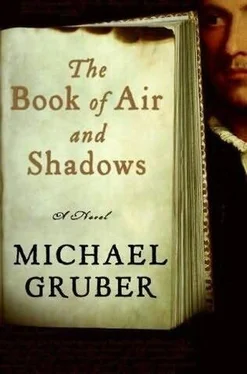Crosetti abruptly rose from the table and brought his plate and cup to the sink, and washed them with the clattering movement of the angry. He said, “Yeah, but we weren’t there. Not everybody has a happy family like we do, and the authorities sometimes screw up. We have no idea of what she went through.”
“Okay, Albert,” said Mary Peg, “you don’t have to break the dishes to make a point. You’re right, we don’t know what she went through. I’m just a little worried about your emotional involvement with a married woman you hardly knew. It seems like an obsession.”
Crosetti turned off the faucet and faced his mother. “It is an obsession, Mom. I want to find her and I want to help her if I can. And to do that I have to decipher those letters.” He paused. “And I’d like your help.”
“Not a problem, dear,” said his mother, smiling now. “It beats playing Scrabble in the long, long evenings.”
The next dayMary Peg began rounding up cryptography resources from the Web and through her wide range of contacts in libraries around the world, via telephone and e-mail. Crosetti called Fanny Doubrowicz at the library and was heartened to learn that she had puzzled out Bracegirdle’s Jacobean handwriting and entered the text of his last letter into her computer. She had also made a transcript of the ciphertext of the spy letters and sent a sample of the paper and ink from those originals to the laboratory for analysis. It was, as far as the lab could determine, a seventeenth-century document.
“This Bracegirdle tells quite a story, by the way,” she said. “It will make a revolution in scholarship, unless it is a pack of lies. If only you had not been so foolish as to sell the original!”
“I know, but I can’t do anything about that now,” said Crosetti, expending some effort at keeping his voice pleasant. “If I can find Carolyn I might be able to get it back. Meanwhile, has anything surfaced on the library grapevine? Blockbuster manuscript found?”
“Not even a peep, and I have called around in manuscript circles. If Professor Bulstrode is authenticating it, he is being very quiet about his doings.”
“Isn’t that strange? I figured he’d be calling press conferences.”
“Yes, but this is a man who has been badly burned. He would not want to go public with this until he had made absolutely sure. However, there are only a few people in the world whose word on such a manuscript would be probative, and I have spoken to all of them. They laugh when they hear Bulstrode’s name and none have heard from him recently.”
“Yeah, well, maybe he’s holed up in his secret castle, just gloating. Look, can you zap those documents over by e-mail? I want to get to work on that cipher.”
“Yes, I will zap now. And I will also send the number of my friend, Klim. I think you will need help. I have looked a little and it does not seem to be a simple thing, this cipher.”
When he had the e-mail, Crosetti made himself print out Fannie’s transcription of the Bracegirdle letter instead of reading it immediately on the screen. Then he read it several times, especially the last part, about the spying mission, and tried not to be too hard on himself for letting the original go. He almost sympathized with Bulstrode, the bastard-the discovery was so huge that he could well appreciate what was going through the guy’s mind when he saw it. He did not allow himself to think about the other, larger prize, as Bulstrode had obviously and immediately done, nor did he keep Carolyn and how she was connected to all this uppermost in his thoughts. Crosetti was an indifferent student most days, but he was capable of intense focus when he was interested in something, like the history of movies, a subject on which he was encyclopedic. Now he turned this focus onto the Bracegirdle cipher and on the tall stack of cryptography books his mother had brought home from various libraries that evening.
For the next six days he did nothing else but go to work, study cryptography, and work on the cipher. On Sunday he again went to church and found himself praying with unaccustomed fervor for a solution. Returning home he made for his room, ready to begin once more, when his mother stopped him.
“Take a break, Allie, it’s Sunday.”
“No, I thought of something else I want to try.”
“Honey, you’re exhausted. Your mind is mush and you’re not going to do yourself any good spinning around like a hamster. Sit down, I’ll make a bunch of sandwiches, you’ll have a beer, you’ll tell me what you’ve been doing. This will help, believe me.”
So he forced himself to sit and ate grilled-cheese sandwiches with bacon and drank a Bud, and found that his mother had been right, he did feel a little more human. When the meal was over, Mary Peg asked, “So what have you got so far? Anything?”
“In a negative sense. Do you know much about ciphers?”
“At the Sunday paper game-page level.”
“Yeah, well that’s a start. Okay, the most common kind of secret writing in the early seventeenth century was what they called a nomenclator, which is a kind of enciphered code. You have a short vocabulary of coded words, box for army, pins for ships , whatever, and these words and the connecting words of the message would be enciphered, using a simple substitution, with maybe a few fancy complications. What we got here isn’t a nomenclator. In fact, I think it’s the cipher Bracegirdle talks about in his letter, the one he invented for Lord Dunbarton. It’s not a simple substitution either. I think it’s a true polyalphabetic cipher.”
“Which means what?”
“It’s a little complicated. Let me show you some stuff.” He left and came back with a messy handful of papers. “Okay, the simplest cipher substitutes one letter for another, usually by shifting the alphabet a certain number of spaces, so that A becomes D and C becomes G and so on. It’s called a Caesar shift because Julius Caesar supposedly invented it, but obviously you can crack it in a few minutes if you know the normal frequencies of the letters in the language it’s written in.”
“ETAOIN SHRDLU.”
“You got it. Well, obviously, spies knew this, so they developed ciphering methods to disguise the frequency of letters by using a different alphabet to pick every substitution in the ciphertext.”
“You mean a literally different alphabet, like Greek?”
“No, no, I mean like this.” He pulled a paper out of the sheaf and smoothed it on the table. “In the sixteenth century the architect Alberti invented a substitution cipher that used multiple alphabets arranged on brass disks, and a little later in France a mathematician named Blaise Vigenère supposedly invented what they call a polyalphabetic substitution cipher using twenty-six Caesar-shifted alphabets, and I figured it or something like it would be known to Bracegirdle if he was studying the cipher arts at that time. This here is what they call a tabula recta or a Vigenère tableau. It’s twenty-six alphabets, one on top of the other, starting with a regular A through Z alphabet and then each successive one starts one letter to the right, from B through Z plus A, then C through Z plus A and B and so on, and there are regular alphabets along the left side and the top to serve as indexes.”
“So how do you use it to disguise frequencies?”
“You use a key. You pick a particular word and run it across the top of the tableau, lining each letter of the key up with each column and repeating it until you reach the end of the alphabet. For example, let’s pick Mary Peg as a key. It’s seven letters with no repeats, so it’s a good pick.” He wrote it out several times in pencil and said, “Now we need a plaintext to encipher.”
Читать дальше












